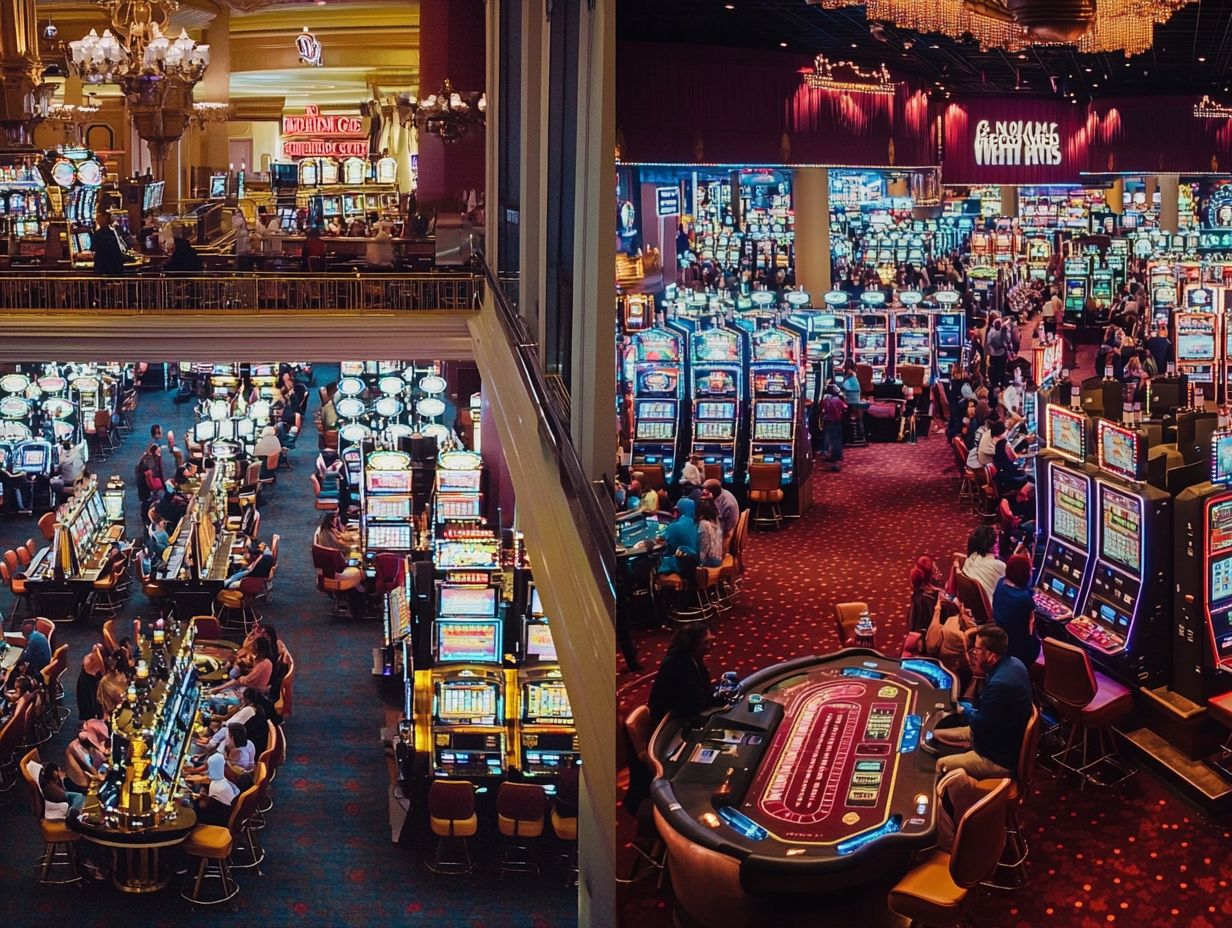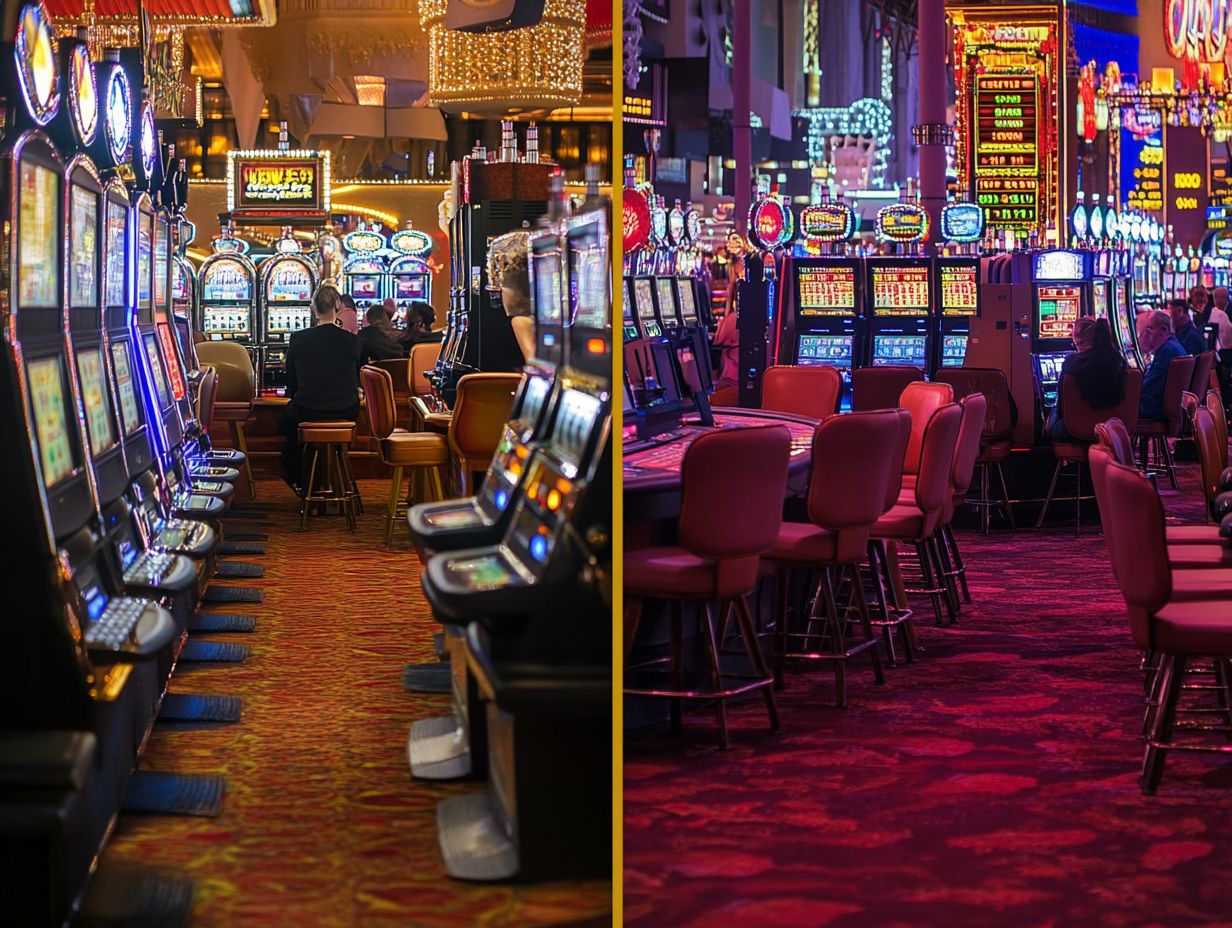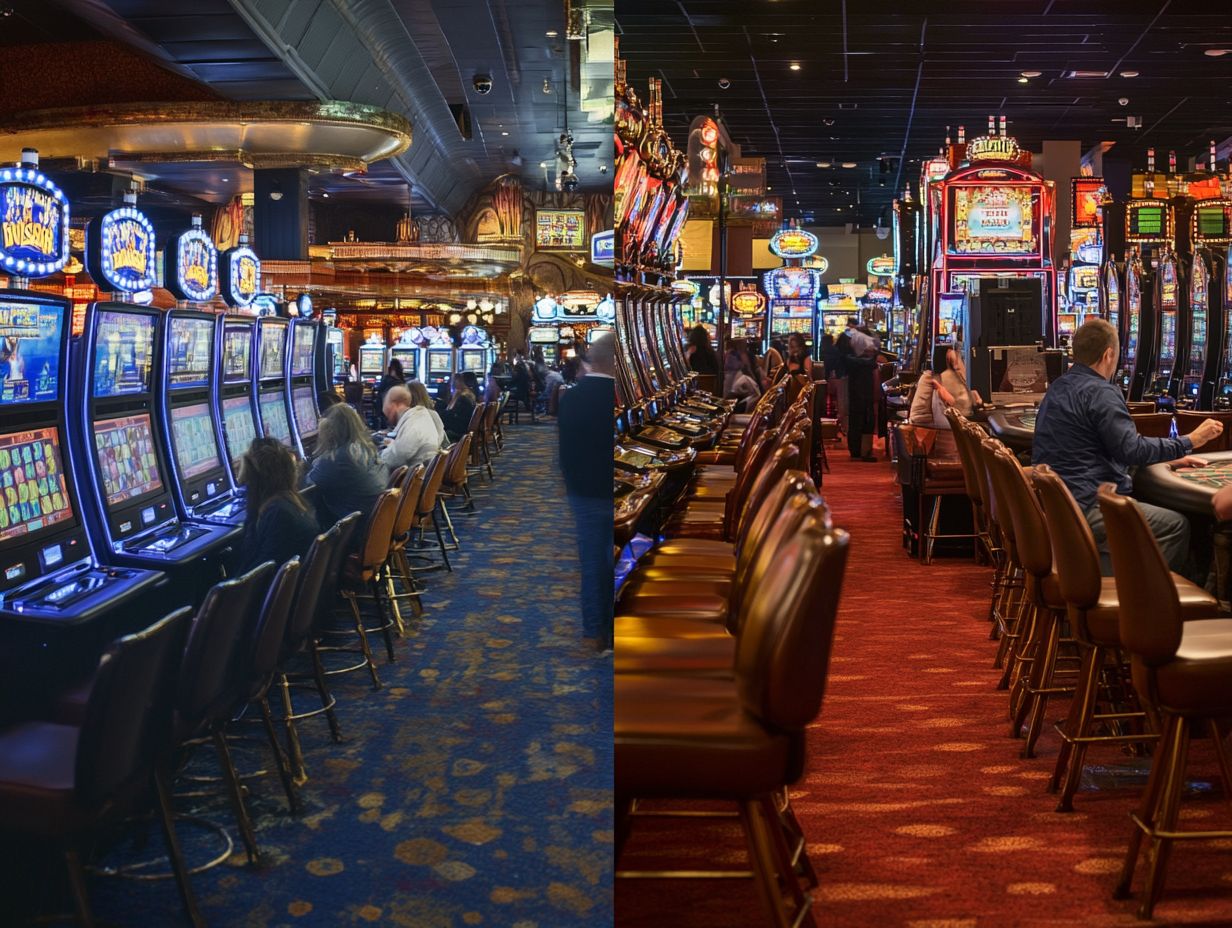Comparing Odds: Are Online Casinos More Lucrative Than Traditional Ones?
Understanding the odds when gambling can significantly enhance players’ decision-making, whether they are at an online casino or a brick-and-mortar establishment. Online casinos offer the convenience of playing from home, while traditional casinos provide an immersive atmosphere. This article explores the various factors that affect odds, including the house edge and payout rates, while comparing the odds of different games such as slot machines, blackjack, roulette, and poker. We will also cover other popular games like baccarat, craps, keno, and bingo. It also examines the advantages and disadvantages of online versus traditional casinos, considering factors like convenience, variety, and social interaction. Discover which option is more favorable in terms of odds!
Explanation of Odds and How They Work

Understanding the odds in both online and traditional casinos is crucial for gamblers who wish to make informed decisions about their gambling habits and enhance their overall experience. Odds represent the likelihood of a particular outcome occurring in a game and play a significant role in determining betting odds, payout percentages, and the house edge. These factors can greatly influence a player’s potential winnings or losses. Additionally, factors such as RTP (Return to Player), wagering requirements, and game variety can affect overall player experience.
Calculating odds involves examining various factors, including the number of winning outcomes compared to all possible outcomes. In games like blackjack, roulette, or poker, grasping the concept of the house edge—the statistical advantage the casino holds—can give the power to players to make more strategic decisions. Additionally, Return to Player (RTP) percentages provide insight into how much money players can expect to recoup over time, which can significantly affect their long-term gambling behavior and risk management strategies.
By comprehending the odds and their implications, players can identify potential advantages and adjust their gameplay accordingly, ensuring they maximize both their enjoyment and profitability. Using odds calculators and analyzing casino bonuses and promotions can further enhance their gaming strategy and experience level.
Factors Affecting Odds in Online and Traditional Casinos

Numerous factors influence the odds in both online and traditional casinos. These factors encompass the types of games available, technological advancements, gaming regulations, and geographical differences, all of which can affect player preferences for gaming experiences, such as mobile gaming, live dealer games, and sports betting. Social gambling and virtual casinos are also influenced by these factors.
House Edge and Payout Rates

The concepts of house edge and payout rates are fundamental in gambling, influencing the profitability and fairness of games offered in both online and land-based casinos.
The house edge represents the mathematical advantage the casino holds over the player, directly impacting payout rates and players’ long-term average returns across various games, including slots and table games such as blackjack, roulette, baccarat, and craps.
Understanding these factors is crucial for players seeking to optimize their strategies and manage their bankroll effectively. Each game has a designated house edge, expressed as a percentage, indicating how much of each bet the casino expects to retain over time. This percentage, in turn, determines payout rates, which inform players of the portion of total wagers returned to them. Examining user reviews and loyalty programs can also provide insights into the player trust and fairness of different casinos.
Random number generators (RNGs), supplied by reputable software developers, help ensure fairness in these calculations.
Players should remain aware of market trends, as new game designs and varying house edges can significantly alter the gambling landscape, potentially requiring adjustments to their strategies for sustainable play. Innovations in gaming software and the emergence of high stakes and low stakes options can also impact player strategies.
Comparison of Odds in Popular Casino Games

Comparing the odds of popular casino games such as online slots, blackjack, roulette, and poker can help players understand which games offer the best chances of winning. Additionally, odds comparison tools and market analysis can aid players in making more informed betting decisions.
By analyzing the odds associated with each game, players can make informed decisions about where to place their bets, considering factors such as game volatility, return to player (RTP) rates, and the types of casino bonuses and promotional offers that may enhance their overall experience. Moreover, understanding the wagering requirements tied to these bonuses is crucial.
Slots, Blackjack, Roulette, and Poker
Slots, blackjack, roulette, and poker rank among the most popular casino games, each offering unique odds and gaming experiences for players. Similarly, games like baccarat, craps, keno, and bingo also attract a significant number of players due to their distinct odds and entertainment value.
While slots are celebrated for their simplicity and diverse themes, blackjack and poker require more strategy and skill, resulting in different house edges and payout potentials that players need to consider when placing their bets.
For example, slots can captivate players with vibrant themes, enticing jackpots, and the potential for high volatility; however, their odds are primarily determined by random number generators (RNGs).
In contrast, blackjack allows for greater player engagement, as players can strategically decide when to hit or stand, thereby influencing their chances of winning.
Roulette, with its appealing simplicity, presents a mix of risk factors depending on the betting style, whether one chooses to bet on colors or specific numbers.
Each game, though distinct, thrives on various strategies that can enhance a player’s overall experience and potentially increase their success at the tables. Utilizing odds calculators and understanding event types and bet types can further refine these strategies.
Benefits and Drawbacks of Online and Traditional Casinos
The advantages and disadvantages of online versus traditional casinos play a significant role in influencing players’ choices between the two. Factors such as convenience, location, and accessibility are key considerations in this decision-making process.
Key factors to consider include player engagement, gambling preferences, social interaction, payment methods, security measures, withdrawal times, customer support, and the overall benefits and drawbacks of each type of casino. Regulation and licensing are also important aspects that influence player trust and safety.
Online casinos provide convenience, a wide variety of games, quick deposits and withdrawals, and often feature live dealer games, mobile gaming options, and accessible payment methods. In contrast, traditional casinos offer socialization and an immersive atmosphere, resulting in different levels of player engagement and satisfaction. These establishments also feature high stakes and low stakes tables, catering to various experience levels and betting preferences.
Convenience, Variety, and Social Interaction
Convenience, variety, and social interaction are key factors that influence a player’s decision to choose online gaming over traditional gaming environments. Online casinos allow players to enjoy gaming whenever and wherever they wish, offering a broader selection of games, including interactive gaming and gamification features. In contrast, traditional casinos provide the social interaction and atmosphere that many players find appealing.
Flexibility is a significant advantage of online gaming, as players can access their favorite games at any time from the comfort of their homes. Online platforms boast a diverse range of titles that cater to different tastes and skill levels. Online casinos also offer special player incentives and loyalty programs to enhance customer retention. Meanwhile, traditional gaming environments foster a sense of community, encouraging interaction and sharing among players.
User feedback plays a crucial role in both settings; online casinos often depend on community forums to gather insights that shape game development. This feedback loop is essential for ensuring that gaming offerings align with player expectations. Understanding user demographics and behavioral patterns helps in tailoring the gaming experience to meet diverse player needs.
The interplay between convenience and social interaction highlights the evolving preferences of players as they adapt their choices based on personal preferences and the desire for community engagement. These preferences are also influenced by technology integration, user interface design, and the availability of mobile apps.




